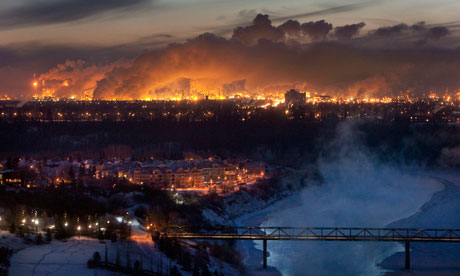Dirty Oil Sands Watch
 F
Forty years ago, many Canadians were taught in school that the oil would never be extracted from the tar sands because it was too expensive. But that did not stop the oil sands companies from trying. The first open pit mine began in 1967 and produced 30,000 barrels per day and it took 10 years before the second mine started producing in 1978.
Thing look very different today. Today there are now 5 mines in operation with 7 more proposed or under construction. There are 9 insitu sites producing with 38 either proposed or in the exploration phase.
Currently there are 1.7 million barrels per day (mbd) extracted from the tar sands. If all the approved projects are built , there would be 5 mbd extracted. But the companies won’t stop there. They are considering enough projects to bring it to 9mbd.
That is over 270 million one litre pop bottles per day being produced right now with a goal of over 1.5 billion one litre pop bottles per day in the future.
In order to get this oil to market, there are plans to have four more pipelines ship the increase oil production to market. This includes:
Keystone XL
Northern Gateway
Kinder Morgan
Trailbreaker
Prime Minister Stephen Harper has made it a priority to expedite the expansion of the tar sands, including the rapid approval of more mines and pipelines. When the Prime Minister found a few obstacles in his way, such as public opposition and regulatory processes designed to protect the environment, he tried to overcome them by attacking nature and democracy. By limiting public engagement in the review of major projects like pipelines, attacking conservation groups, and gutting environmental legislation, Harper and the Government of Canada is determined to expand the tar sands putting at risk communities, land, air, water, the climate, and democracy. This must be stopped.
Instead of Harper’s petro-state we need to a low carbon economy, creating jobs and economic prosperity based on the development of clean energy. Pessimists say it can’t be done, that it is too expensive, and that we cannot produce enough energy to replace our dependence on oil. But if people were able to extract oil from the tar sands surely we can figure out a way to harness clean energy and protect our land, air, and water.

















